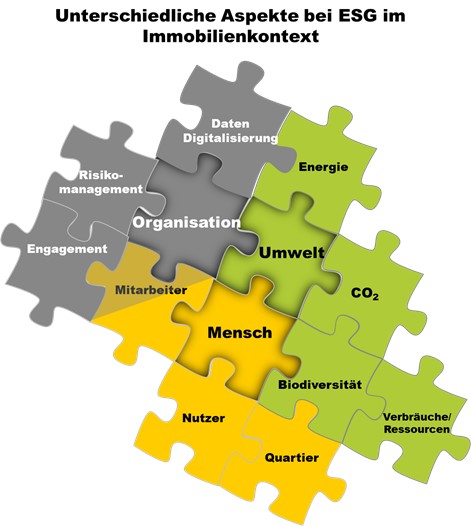We participated in the lecture series "Praxis Real Estate" of the Frankfurt University of Applied Sciences on Thursday, January 27, 2022. There, one of our managing directors, Sebastian Hölzlein, reported on our experiences in establishing the currently ubiquitous topics of ESG and digitalization in REM with our clients. Buildings are one of the world's largest sources of greenhouse gas emissions, accounting for 38% of the total; the main factor here is building operations.
According to the Climate Protection Act, CO2 emissions from buildings in Germany are to be reduced by 59% by 2030. To achieve this ambitious goal, various regulations provide guidance, such as the Taxonomy Regulation, Sustainable Finance Disclosure Regulation and the Corporate Sustainability Reporting Directive. Alpha IC GmbH, one of the leading consulting companies for real estate management, is currently experiencing the pressure to act and the irritation of the market in numerous mandates. There is still a lack of approaches to make ESG applicable to all aspects of real estate management, as the regulations are not yet fully defined. In some cases, there are serious changes in processes, interfaces and remuneration models. In addition, the various players in real estate management face different challenges. For example, a fund manager has different interests and requirements to consider than a classic project developer.
These organizational and investment changes do not happen overnight, but it is important to start. Approaches such as climate risk analyses, the establishment of a decarbonization path, the definition of a job description for ESG managers and many other aspects must be integrated into the consulting work and established with the customer. The figure below shows a selection of the topics that, in our view, must be taken into account in holistic ESG consulting.
Another aspect that is increasingly being taken into account, for example by developers or corporates in the planning of real estate projects or neighbourhoods, is the growing service concept for the user. The focus is on people and their needs. The work & finance domains are increasingly merging with other areas of life, such as health & fitness and purpose & culture. For users, time is the most important commodity and their demands on a workplace or place of residence have increased. For this purpose, forward-looking project planning can offer, for example, shopping facilities, a gym or other leisure facilities on the premises or in the property to increase user comfort and their satisfaction. The realization of smart buildings also makes it possible, for example, to create an optimal indoor climate, provide user-specific information and network all services on the site with each other. In Sebastian Hölzlein's view, it is important to ask exactly which services are really necessary and what the benefits of the collected information are. The industry is still in its infancy here and there is still no standard solution or tools for carrying out IoT projects. For this reason, it needs a transformer: an external or internal person who understands digital, planning and operations and can bridge these interfaces.
Once again, we would like to thank Prof. Dr. Jonas Hahn and Anna-Katharina Haux on behalf of Frankfurt University of Applied Sciences for the invitation. We were pleased about the great interest of the students and the questions afterwards and wish them all the best for the upcoming examinations.
For those who would like to delve deeper into the topic of ESG and its impact on real estate management, we recommend our blog series "ESG in Real Estate Practice - Perspectives and Approaches". You can find the start of the series here.




